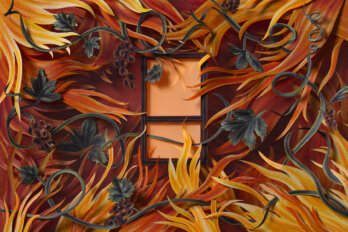A few years ago, I accidentally midwifed a death. She was an elderly woman who had lived alone for many years, and though her death should, on some level, have been expected, it came as a shock to me. Her name was Agatha, but she told me once that she’d had another name given to her by her grandfather because Agatha was an old family name and had already belonged to too many people.
Listen to an audio version of this story
For more audio from The Walrus, subscribe to AMI-audio podcasts on iTunes.
At Agatha’s funeral, I would learn what her secret name was, and it would make me sad because, the whole time she was dying, I was calling out the name I knew. She was getting further and further away, and it wasn’t that I thought she would come back but just that I wanted her to know I was still there. But I was calling her by the name that had already been worn out when it reached her.
For a while, I volunteered at a seniors’ centre where most of the clients had dementia. I became very fond of a woman named Marjorie, who was in her nineties but was more alive than most people I knew. Marjorie was convinced that we’d been schoolmates. “Chummed around together” was how she put it. I’d get her to tell me stories and then, the next time I saw her, I’d remind her of things we had done together when we were both at boarding school in Rothesay, New Brunswick. Sometimes we would talk about what it had been like at McGill just after the war. The larks we’d gotten up to. It was all lies, of course. But it was also true.
There’s a story I’ve never quite been able to tell. It’s about something that happened to me one Halloween when I was in my twenties. We lived at that time in a haunted house, but this story is not about that. Our apartment was part of a building of row houses that opened right onto the sidewalk of Milton Street in Montreal. During the day, if you sat in our living room, you could listen to the conversations of passersby, a thing I used to do that proves I knew how to waste time even before we had internet.
But this was nighttime. I was alone because I’d decided not to go to the Halloween party that night. I didn’t like Halloween, and I wasn’t crazy about parties. There were too many parties in those days. I stayed home and probably read a book because we didn’t own a television and there was, as I said, no internet. I have a picture of myself from that time standing in front of our bookcase, so it’s possible I could even work out what book I was reading. It might have been Nightwood as those were my Djuna Barnes years. It could have been a book I loved at the time called That Kind of Woman. It’s extraordinary to me that, in those days, all the books we owned fit into one bookcase. And that this still felt like untold riches.
There I was, in the living room that was practically right on the sidewalk, and there was a knock at the door. A loud, frantic knock. I went and opened it. Did I think it was someone I knew? Did I just open my door to anyone in those days? Yes, probably.
It was a young woman, roughly my age, much, much smaller. Shaking, cold, frightened. “Help me,” she said, and so I let her in and closed the door behind her.
She said her boyfriend was chasing her. That she was frightened. That she wanted to call her mother to come and get her. Could she use my phone?
I watched her dial, listened to her talk. “Yes, again,” she said. “I know,” she said. “Milton Street,” she said. And then she hung up.
She asked me for a glass of water, and I went out to the kitchen to get it for her. The kitchen was my favourite part of that apartment. I stood there for a moment, letting the water run. I knew there was something wrong with her story. I knew something was wrong. I didn’t know how it was going to end.
I had no idea that police come out in the event of a sudden death at home. When my friend Agatha died, I first called my husband and then asked him to call 911. I had to open the door to the first responders, who turned out to be our local fire brigade, then the paramedics, then the police. Agatha’s apartment was small, and it filled quickly. I kept having to explain who I was. Not a granddaughter. Not an employee or a care worker. A friend.
The police officer and I had been operating at cross-purposes with my poor French and his poor English, so when he asked me if he could read what I write, it seemed a bit of a non sequitur. Flustered already, I grew more flustered and told him that I had a review in that weekend’s Globe and Mail. He shook his head impatiently. “No, no,” he said (non, non). “Can I read your handwriting?”
He then gave me a pen and paper (looking back, I see something like the exam booklets we hand out to students), and I wrote my statement. When you are writing fiction, it is as much about what you leave out as what you leave in. Writing
a police statement seemed much the same. I kept wondering what it was that they were looking for. Evidence that her death was somehow my responsibility? It felt that way.
I wrote that I had made her breakfast shortly before she died. That I had to insist because she was so weak and I was worried that she hadn’t been eating in the days prior, which she had spent locked away in her apartment with what she’d told me was a cold. That she finally agreed to a boiled egg but then stood over me as I leaned into her fridge, and that, when I opened the carton of farm eggs and instinctively chose the largest one, she put out her hand to stay mine. “I’m saving that one for someone,” she said.
I used to have a newspaper column. When my son was small, he opened the paper one time and looked at my little headshot in there and said, “Why is your picture in the paper every week when you aren’t even famous?”
Writing weekly book reviews for the newspaper is exactly the sort of job I would have dreamt of in high school if I could have even dreamt of such a thing. I worked from home and, practically daily, books would be delivered to my door. As if things couldn’t get any better, I then got a similar job but for radio instead of print. Every week, I would be interviewed by the hosts of the afternoon show about a different book. I wrote both their questions and my answers, and we worked from that script. Sometimes I would begin my answers with the phrase, “Funny you should ask that,” because it amused me.
I think I’d do a lot better in life if I could always write both the questions and the answers. All my life, I have been bothered by the question of whether things happen for a reason. I try to imagine myself reciting a scripted response to that, but all I hear is silence.
Once, I heard my son and his friend quietly conversing as I walked behind them through a forest on a perfect sunny day.
“I don’t want to die,” my son said.
“I know,” said the other boy. “But we have to.”
Sometimes my friend Marjorie—friend of my fictional youth—would move forward in time and begin to worry about where her husband was. She would anxiously scan the faces in the room, looking for the one she knew best. She would imagine that we were all at a party together and, if she was there, then he must be too. Sometimes she would turn her chair so that she could see the door in case he came through it. “I hope he hasn’t forgotten me,” she’d say. He had died years ago, but I would always reassure her by saying he was on his way. “Of course he hasn’t forgotten you,” I’d say. “He called. He told me he would be here soon.”
As a child, I was taught that lying was the worst thing you could do. I was taught to tell the truth. Only later would I learn that sometimes you have to tell it slant.
That Halloween night on Milton Street, I returned from the kitchen with the glass of water to find the young woman shaking even harder than before. She said she would go out to the corner to wait for her mother. She said she would be fine. I didn’t want to let her go and I didn’t want her to stay. Just before I closed the door, she took my hand and looked me in the eyes. “You’re a good person,” she said.
I think about that all the time. Am I a good person?
When I called the police, they told me that I was not the only one in my neighbourhood who had been conned. They said they would let me know if they recovered my wallet but not to get my hopes up.
When that woman had told me her story, I knew it didn’t ring true. I knew there was a lie in it somewhere. But what I didn’t know, and what I still don’t know, is why she said what she said at the end. I don’t know if she really did think I was a good person. I don’t know why I care.
Here’s the thing I now know about dying. It looks like almost anything else. It sometimes looks like sitting down to eat an egg. It looks like just resting for a moment. It looks like just slowing down. The difference between the slowing down and the stopping is nothing at all.
At Agatha’s funeral, people I didn’t know would come up to talk to me about the fact that I had happened to be there with her when she died. Somehow everyone seemed to know this about me, which was unsettling. “Things happen for a reason,” they kept saying.
Agatha once told me that she believed her son had sent me to be with her, but I didn’t see how that could be true. While Marjorie couldn’t remember the death of her husband, Agatha couldn’t forget the death of her son. She’d been abandoned by her husband, and her son had been everything to her. Then, when he was twenty-one, he died, and even though he was gone, she never stopped being his mother. I can’t imagine being in the world that long after your child has left it. Wouldn’t it be a kindness to be able to forget?
I used to think that the fear we have of dying was tied to the fear of being forgotten. But now, I think that what we’re really afraid of is the ones we love being forgotten. The ones we have lost and carry with us. I knew Agatha for only a very short time at the end of her long life. But, before I left her empty apartment that day, I picked up a photo of her son, which she had left out, meaning to show me, and I took it with me.





